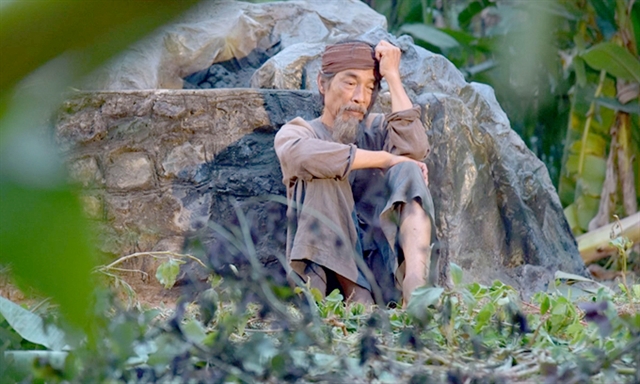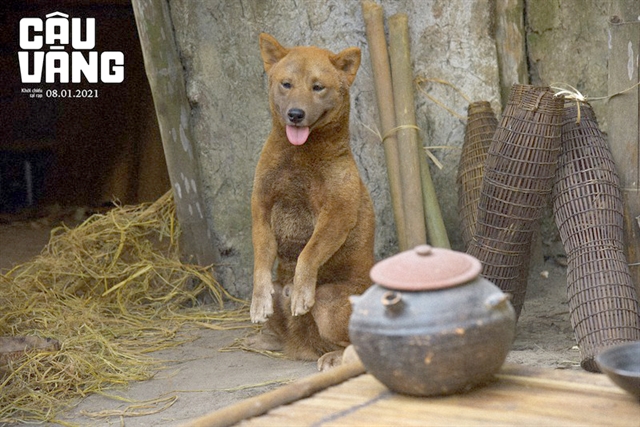 Life & Style
Life & Style

The famous short story Lão Hạc by Nam Cao has been remade into a movie called Cậu Vàng, named after the endearing way to refer to the dog owned by the main character, old man Lão Hạc.
Hoàng Vân Anh
The famous short story Lão Hạc by Nam Cao has been remade into a movie called Cậu Vàng, named after the endearing way to refer to the dog owned by the main character, old man Lão Hạc.
To summarise the original plot, Lão Hạc was a poor old man whose son left home to earn more money for a dowry to get married. He sold his dog because he ran out of money to feed him. Determined to save money for his son’s marriage and to keep the land for his son, Lão Hạc committed suicide. He was heavily oppressed and ignored due to the feudal regime that disadvantaged poor people then.

|
| Picture of Lão Hạc, the main character sitting in front of his well. Photo ngoisao.net |
A week after the movie premiered, many criticisms have been levied against it based on the superficial adaptation. Director Trần Vũ Thuỷ attempted to adapt the story into a movie but overly digressed from the plot to the disbelief of viewers.
The movie included touching moments of human connections, showing how Lão Hạc's neighbours, the village's teacher and his wife, paid attention to and cared for Lão Hạc when his son was away. Another character, the third wife, Mợ Ba, was also kind-hearted to her servant and others despite her higher social class.
However, many new characters were added in the movie, leading to a diluted, disrupted story. Limited screen time was given to too many trivial details, forsaking main character development. Characters who should’ve had major character development were given too little screen time, making them seem like supporting characters instead.
The movie failed to clearly emphasise important plot points, so the overall plot was tangled and chaotic. Viewers were constantly surprised by the hurried transitions between events without suitable connections.

|
| Cậu Vàng, played by a Japanese Shiba Inu, received mixed opinions from viewers. Photo vnreview.vn |
Distasteful, mean characters were the focus to add drama to the movie. Lý Cường, the son of Bá Kiến, the richest man in town, sexually harassed his dad’s third wife when she was pregnant. The character development of Bình Tư the thief was also confusing as he suddenly turned good when Cậu Vàng the dog saved his life.
The acting did not match the narration. While the narration was really emotional, the acting was half-hearted and failed to match the voiceover.
While they tried to stick to the original setting of Northern Việt Nam during the miserable wartime period, some details were added to be inclusive of Southern characters, like recruiting the third wife all the way from the South, or the singing band from the South for no reason.
The characters failed to show how tough people’s lives back then once were. In the story, people were so hungry they couldn’t even feed themselves, yet the actors all looked good, healthy and clean. Even the houses, pagoda and market were clean and new.
Some scenes were comical to the point of ridiculousness. The fortune-teller jumping and rolling around, pretending to be reading the fortune of the house just seemed like an attempt to give the audience a laugh, completely disconnected from the purpose of sketching the daily lives of people in difficult times.
Characters like Lý Cường despised the dog Cậu Vàng so much, a lot of the scenes focus on him plotting to attack the dog, forgetting the main storyline. When Cậu Vàng left the house and Lão Hạc indefinitely, he became the leader of some stray dogs. These details without a clear intention confuse the viewers and make them lose the focus on the main storyline.
The purpose of the movie was confusing. The director was trying to entertain viewers while recreating a meaningful story and failed to do both as he tried to combine two completely separate purposes together. He mentioned he was inspired by the story and intended to renovate the storyline. However, the final product brought dishonour to author Nam Cao instead of paying tribute to him.
Overall, the movie was historically inappropriate, strayed from the original purpose of remaking and paying homage to a famous short story. The additions of love stories and unnecessary details distracted viewers from the main storyline. — VNS




